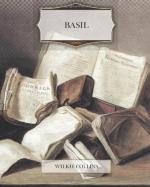“And I’ll lay another wager, if he’s mad enough to annoy us, that we are the people to shut him up,” said Ralph. “There is the address. And now, we needn’t waste your time any longer. I have taken a little place at Brompton, Jack,—you and Basil must come and dine with me, as soon as the carpets are down.”
We left the room. As we crossed the hall, a gentleman came forward, and spoke to Mr. Bernard.
“That man’s fever in the Victoria Ward has declared itself at last,” he said. “This morning the new symptoms have appeared.”
“And what do they indicate?”
“Typhus of the most malignant character—not a doubt of it. Come up, and look at him.”
I saw Mr. Bernard start, and glance quickly at my brother. Ralph fixed his eyes searchingly on his friend’s face; exclaimed: “Victoria Ward! why you mentioned that—;” and then stopped, with a very strange and sudden alteration in his expression. The next moment he drew Mr. Bernard aside, saying: “I want to ask you whether the bed in Victoria Ward, occupied by this man whose fever has turned to typhus, is the same bed, or near the bed which—” The rest of the sentence was lost to me as they walked away.
After talking together in whispers for a few moments, they rejoined me. Mr. Bernard was explaining the different theories of infection to Ralph.
"My notion,” he said, “is, that infection is taken through the lungs; one breath inhaled from the infected atmosphere hanging immediately around the diseased person, and generally extending about a foot from him, being enough to communicate his malady to the breather—provided there exists, at the time, in the individual exposed to catch the malady, a constitutional predisposition to infection. This predisposition we know to be greatly increased by mental agitation, or bodily weakness; but, in the case we have been talking of,” (he looked at me,) “the chances of infection or non-infection may be equally balanced. At any rate, I can predict nothing about them at this stage of the discovery.”
“You will write the moment you hear anything?” said Ralph, shaking hands with him.
“The very moment. I have your brother’s address safe in my pocket.”
We separated. Ralph was unusually silent and serious on our way back. He took leave of me at the door of my lodging, very abruptly; without referring again to our visit to the hospital.
A week passed away, and I heard nothing from Mr. Bernard. During this interval, I saw little of my brother; he was occupied in moving into his new house. Towards the latter part of the week, he came to inform me that he was about to leave London for a few days. My father had asked him to go to the family house, in the country, on business connected with the local management of the estates. Ralph still retained all his old dislike of the steward’s accounts and the lawyer’s consultations; but he felt bound, out of gratitude for my father’s special kindness to him since his return to England, to put a constraint on his own inclinations, and go to the country as he was desired. He did not expect to be absent more than two or three days; but earnestly charged me to write to him, if I had any news from the hospital while he was away.




